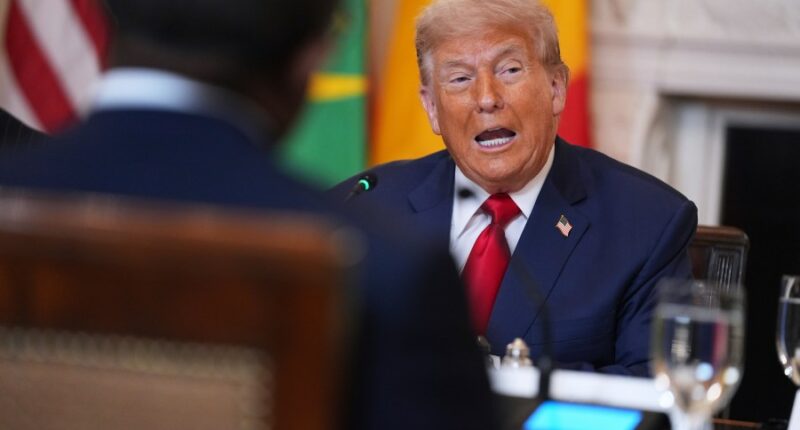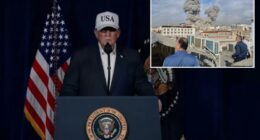Share this @internewscast.com

WASHINGTON (AP) President Donald Trump sent out tariff letters to seven smaller U.S. trading partners on Wednesday with a pledge to announce import taxes on other countries later in the day.
None of the countries targeted in the first batch of letters the Philippines, Brunei, Moldova, Algeria, Libya, Iraq and Sri Lanka is a major industrial rival to the United States. It’s a sign that a president who has openly expressed his love for the word “tariff” is still infatuated with the idea that taxing trade will create prosperity for America.
Most economic analyses say the tariffs will worsen inflationary pressures and subtract from economic growth, but Trump has used the taxes as a way to assert the diplomatic and financial power of the U.S. on both rivals and allies. His administration is promising that the taxes on imports will lower trade imbalances, offset some of the cost of the tax cuts he signed into law on Friday and cause factory jobs to return to the United States.
Trump, during a White House meeting with African leaders talked up trade as a diplomatic tool. Trade, he said, “seems to be a foundation” for him to settle disputes between India and Pakistan, as well as Kosovo and Serbia.
“You guys are going to fight, we’re not going to trade,” Trump said. “And we seem to be quite successful in doing that.”
On Monday, Trump placed a 35% tariff on Serbia, one of the countries he was using as an example of how fostering trade can lead to peace.
Trump said the tariff rates in his letters were based on “common sense” and trade imbalances, adding that he would be sending a letter on Wednesday or Thursday to Brazil. Trump suggested he had not thought of penalizing the countries whose leaders were meeting with him in the Oval Office Liberia, Senegal, Gabon, Mauritania and Guinea-Bissau as “these are friends of mine now.”
Countries are not complaining about the rates outlined in his letters, he said, even though those tariffs are close to the ones announced April 2 that rattled financial markets. The S&P 500 index was up slightly in Wednesday afternoon trading.
“We really haven’t had too many complaints because I’m keeping them at a very low number, very conservative as you would say,” Trump said.
Officials for the European Union, a major trade partner and source of Trump’s ire on trade, said Tuesday that they are not expecting to receive a letter from Trump listing tariff rates. The Republican president started the process of announcing tariff rates on Monday by hitting two major U.S. trading partners, Japan and South Korea, with import taxes of 25%.
According to Trump’s letters, imports from Libya, Iraq, Algeria and Sri Lanka would be taxed at 30%, those from Moldova and Brunei at 25% and those from the Philippines at 20%. The tariffs would start Aug. 1.
The Census Bureau reported that last year U.S. ran a trade imbalance on goods of $1.4 billion with Algeria, $5.9 billion with Iraq, $900 million with Libya, $4.9 billion with the Philippines, $2.6 billion with Sri Lanka, $111 million with Brunei and $85 million with Moldova. The imbalance represents the difference between what the U.S. exported to those countries and what it imported.
Taken together, the trade imbalances with those seven countries are essentially a rounding error in a U.S. economy with a gross domestic product of $30 trillion.
The letters were posted on Truth Social after the expiration of a 90-day negotiating period with a baseline levy of 10%. Trump is giving countries more time to negotiate with his Aug. 1 deadline, but he has insisted there will be no extensions for the countries that receive letters.
Maros Sefcovic, the EU’s chief trade negotiator, told EU lawmakers in Strasbourg, France, on Wednesday that the EU had been spared the increased tariffs contained in the letters sent by Trump and that an extension of talks until Aug. 1 would provide “additional space to reach a satisfactory conclusion.”
Trump on April 2 proposed a 20% tariff for EU goods and then threatened to raise that to 50% after negotiations did not move as fast as he would have liked, only to return to the 10% baseline. The EU has 27 member states, including France, Germany, Italy and Spain.
The tariff letters are worded aggressively in Trump’s style of writing. He frames the tariffs as an invitation to “participate in the extraordinary Economy of the United States,” adding that the trade imbalances are a “major threat” to America’s economy and national security.
The president threatened additional tariffs on any country that attempts to retaliate. He said he chose to send the letters because it was too complicated for U.S. officials to negotiate with their counterparts in the countries with new tariffs. It can take years to broker trade accords.
Japanese Prime Minister Shigeru Ishiba interpreted the Aug. 1 deadline as a delay to allow more time for negotiations, although he cautioned in remarks that the tariffs would hurt his nation’s domestic industries and employment.
Malaysia’s trade minister, Zafrul Aziz, said Wednesday that his country would not meet all of the U.S. requests after a Trump letter placed a 25% tariff on its goods. Aziz said U.S. officials are seeking changes in government procurement, halal certification, medical standards and digital taxes. Aziz he indicated those were red lines.
Secretary of State Marco Rubio is set to arrive Thursday in Malaysia’s capital of Kuala Lumpur.
___
Associated Press writers David McHugh in Frankfurt, Germany and Eileen Ng in Kuala Lumpur, Malaysia, contributed to this report.











